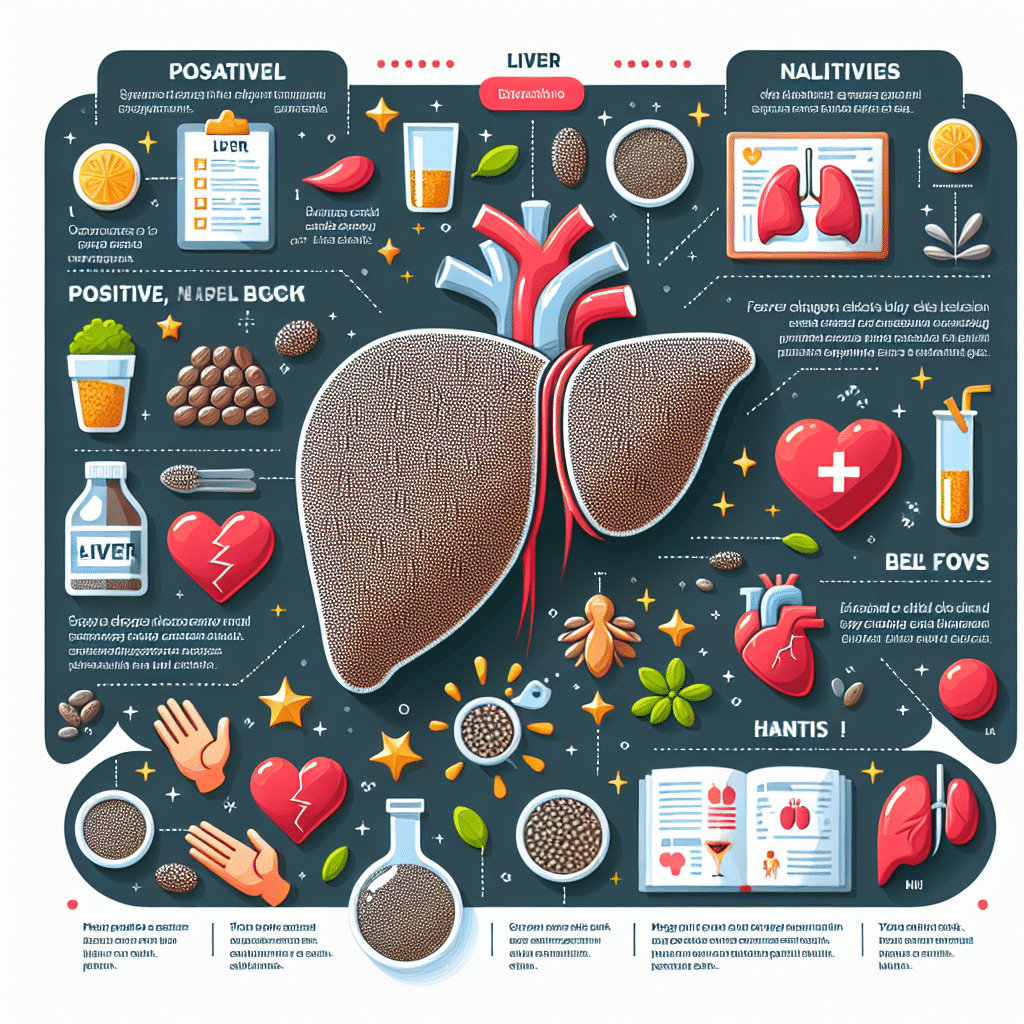Are Chia Seeds Good Or Bad To Liver?
-
Table of Contents
- Chia Seeds and Liver Health: A Comprehensive Analysis
- The Nutritional Profile of Chia Seeds
- Chia Seeds and Liver Health: The Benefits
- Potential Concerns and Considerations
- Scientific Research on Chia Seeds and Liver Health
- How to Incorporate Chia Seeds into Your Diet
- Conclusion: Chia Seeds as Part of a Liver-Friendly Diet
- Discover ETprotein’s High-Quality Protein Products
Chia Seeds and Liver Health: A Comprehensive Analysis

Chia seeds have gained popularity in the health food scene as a superfood, and for good reason. These tiny seeds are packed with nutrients, including omega-3 fatty acids, fiber, protein, and antioxidants. However, with the rise in popularity of any food, it’s important to examine its effects on various aspects of health, including liver function. This article delves into the question: Are chia seeds good or bad for the liver?
The Nutritional Profile of Chia Seeds
Before we explore the impact of chia seeds on liver health, let’s first understand their nutritional content:
- Omega-3 Fatty Acids: Chia seeds are rich in alpha-linolenic acid (ALA), a type of plant-based omega-3 fatty acid.
- Fiber: They are an excellent source of dietary fiber, which is crucial for digestive health.
- Protein: Chia seeds contain a significant amount of protein, which is vital for muscle repair and growth.
- Antioxidants: These seeds are loaded with antioxidants that help combat oxidative stress in the body.
- Minerals: Chia seeds are a good source of minerals such as calcium, magnesium, and phosphorus.
Chia Seeds and Liver Health: The Benefits
When it comes to liver health, chia seeds may offer several benefits:
- Anti-inflammatory Properties: The omega-3 fatty acids in chia seeds have anti-inflammatory effects, which can be beneficial for those with liver inflammation.
- Fiber Content: The high fiber content in chia seeds can aid in the elimination of toxins through the digestive tract, reducing the liver’s detoxification burden.
- Antioxidant Activity: Antioxidants in chia seeds can help protect the liver cells from damage caused by free radicals.
- Weight Management: Chia seeds can promote satiety and help in weight management, which is crucial since obesity is a risk factor for non-alcoholic fatty liver disease (NAFLD).
Potential Concerns and Considerations
While chia seeds have many health benefits, there are a few considerations to keep in mind:
- Caloric Content: Chia seeds are calorie-dense, so consuming them in large amounts without adjusting overall caloric intake could lead to weight gain.
- Omega-3 to Omega-6 Ratio: It’s important to maintain a balance between omega-3 and omega-6 fatty acids in the diet. Overconsumption of omega-6s can lead to inflammation, potentially affecting liver health.
- Gastrointestinal Effects: Due to their high fiber content, excessive consumption of chia seeds may lead to gastrointestinal issues such as bloating or constipation, which could indirectly affect liver health.
Scientific Research on Chia Seeds and Liver Health
Several studies have investigated the effects of chia seeds on liver health:
- A study published in the Journal of Biomedicine and Biotechnology found that chia seeds can reduce liver fat and improve liver function in rats with NAFLD.
- Research in the European Journal of Clinical Nutrition suggests that ALA, the type of omega-3 found in chia seeds, may decrease the risk of liver diseases.
However, it’s important to note that more research, especially in humans, is needed to fully understand the impact of chia seeds on liver health.
How to Incorporate Chia Seeds into Your Diet
Here are some tips for adding chia seeds to your diet:
- Add them to smoothies or yogurt for a nutrient boost.
- Use chia seeds as a topping for salads or oatmeal.
- Make chia pudding by soaking the seeds in milk or a milk alternative.
- Incorporate chia seeds into baked goods for added texture and nutrition.
Conclusion: Chia Seeds as Part of a Liver-Friendly Diet
In conclusion, chia seeds can be a beneficial addition to a liver-friendly diet due to their anti-inflammatory properties, high fiber content, and antioxidants. However, moderation is key, and it’s important to consider the potential concerns associated with their consumption. As with any dietary change, it’s advisable to consult with a healthcare professional, especially if you have existing liver conditions.
Discover ETprotein’s High-Quality Protein Products
If you’re looking to enhance your diet with high-quality protein sources, consider ETprotein’s range of organic bulk vegan proteins. Their products, including organic rice protein, pea protein, and various seed proteins, are non-GMO, allergen-free, and boast a neutral taste. ETprotein’s offerings are ideal for those seeking to support their liver health through a balanced diet rich in plant-based proteins.
About ETprotein:
ETprotein, a reputable protein and L-(+)-Ergothioneine (EGT) Chinese factory manufacturer and supplier, is renowned for producing, stocking, exporting, and delivering the highest quality organic bulk vegan proteins and L-(+)-Ergothioneine. They include Organic rice protein, clear rice protein, pea protein, clear pea protein, watermelon seed protein, pumpkin seed protein, sunflower seed protein, mung bean protein, peanut protein, and L-(+)-Ergothioneine EGT Pharmaceutical grade, L-(+)-Ergothioneine EGT food grade, L-(+)-Ergothioneine EGT cosmetic grade, L-(+)-Ergothioneine EGT reference grade and L-(+)-Ergothioneine EGT standard. Their offerings, characterized by a neutral taste, non-GMO, allergen-free attributes, with L-(+)-Ergothioneine purity over 98%, 99%, cater to a diverse range of industries. They serve nutraceutical, pharmaceutical, cosmeceutical, veterinary, as well as food and beverage finished product distributors, traders, and manufacturers across Europe, USA, Canada, Australia, Thailand, Japan, Korea, Brazil, and Chile, among others.
ETprotein specialization includes exporting and delivering tailor-made protein powder and finished nutritional supplements. Their extensive product range covers sectors like Food and Beverage, Sports Nutrition, Weight Management, Dietary Supplements, Health and Wellness Products, and Infant Formula, ensuring comprehensive solutions to meet all your protein needs.
As a trusted company by leading global food and beverage brands and Fortune 500 companies, ETprotein reinforces China’s reputation in the global arena. For more information or to sample their products, please contact them and email sales(at)ETprotein.com today.














